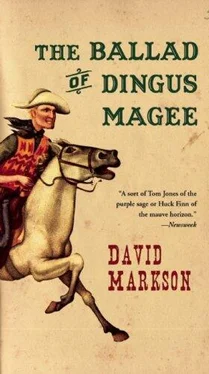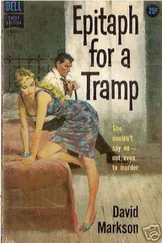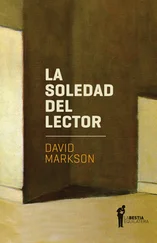Then Hoke was running. And this too, this without question now was instinct, some queer spontaneous impulse beyond thought, because still he had not seen him yet at all — had bolted from the surrey and was sprinting across the eroded ancient plowditches and had actually covered one third of the distance to the house before he did, before Dingus appeared. Dingus still wore the red dress, although without the bonnet now, without the pillow as well. He had emerged leisurely, carrying a shovel, strolling toward the barn.
And then perhaps Hoke was thinking again at last, had begun to think, to remember, the lost money, rewards gained and stolen and re-established and lost again, frustration that seeped to the deepest marrow of his bones, the aggregate affront to his soul itself. Perhaps he was, because he told himself, “Yair, but he’s kilt now, at last he’s kilt and I kin get some peace.” But there remained something scarcely rational about him at the same time, even then, since he did not shoot but merely continued to run, if not quite without reason then recklessly at the very least since the furrowed earth had begun to give beneath his boots now, was crumbling with every stride so that he slipped and flailed and almost fell more than once. But he was lucky too. Dingus himself had still failed to notice him, still strolled there casually.
Then Hoke saw Dingus see him. And still he ran, heedless, the Smith and Wesson cocked in his fist now but with that still not raised for use yet either, toward where the other had abruptly whirled, where Dingus himself now stood likewise without firing or possibly even unarmed since he made no move to withdraw a weapon from his garments, from the red frills. Probably it was incredulity more than surprise which held him, momentary incapacity at the sight of Hoke in a dress of his own and with the irrationality patent in his very headlong attitude itself, as he stumbled and tripped yet came on maniacally like some infuriated hellbent mad scarecrow and still not firing but worse, looking as if he did not intend to fire at all but instead would obliterate Dingus through the sheer lunatic inertia of the rush alone. Hoke plunged on as if to run right over him.
Dingus threw the shovel. He was at last turning to flee then, however, so that Hoke did not have to swerve or even falter as the ponderous spinning missile shot wildly past his ear. Dingus darted back toward the house, his skirts sailing. Hoke was less than a dozen strides behind him.
He had closed half of that gap when Dingus disappeared as if swallowed by the earth itself.
Hoke pitched onto his face. In less than the duration of a blink against the sun, against the flung dirt from his heels, miraculously, Dingus was gone, Hoke was absolutely alone in the field.
But Hoke was truly thinking again now after all. Or perhaps not, perhaps this too was intuition, since it came so quickly that even bafflement was precluded for more than the first fleeting instant and after that he was up and plunging onward as before. “Because it’s jest a well,” he told himself and it was, although the mortared stones that had once encircled it had crumbled away and lay now scattered some distance beyond the pit itself. It was not wide, not four feet across. It was not deep either, clogged with earth and debris. From perhaps eight feet down Dingus was gaping wide-eyed, truly astonished — and at his own predicament rather than at the sight of Hoke now — but with his hands already braced against the shaft at his either side and posed as if to defy gravity and human capability and his own bewilderment at once, as if set to sprint back up and out again. “Now Hoke,” he said. “Now Hoke—”
Perhaps Hoke heard Belle also then, the single prohibitive outcry from somewhere behind him as she hastened across the field herself. Hoke was panting, and his chest filled and fell, but he did not wait. He did not even listen.
Steadying the Smith and Wesson in both hands, aiming with infinite deliberation, Hoke emptied all charged chambers into the narrow well.
The shots banged and echoed in the shaft, reverberating out across the low hills, repeating fitfully. Hoke Birdsill filled his lungs hungrily with the sweet warm air, with the pure cleansing taste of exoneration at last, of release. He did not look; there could scarcely be less need. With his shoulders squared as if for the first time in decades, unabashed by even the dress now, he strode back to meet Belle.
She had stopped some yards away. Nor did she move now, facing him with a kind of grim, constrained ferocity as he approached. Finally, wearily, she sobbed once. “Find it,” she said.
“What’s that, Belle?”
“What we came after, you banana-head. The safe. My money. You can use that shovel he ought to have brained you with. It shouldn’t take you more than eight or ten months to dig up every square foot of ground out here that he might have picked to—”
“But—”
She got around to hitting him then, a response he was growing accustomed to. He went down stifflegged, precisely as he had the last time, save with no wall to slump against. It didn’t hurt. He sat forlornly for a moment or two just watching while she herself gazed stolidly about, wishing remotely that he were back in Yerkey’s Hole with young Fiedler and his womenless troopers. The captain seemed intelligent, the last sort to be engulfed in such sexual maelstroms. Hoke wished advice.
“All right,” Belle was saying at last, “maybe we’ll have some luck. Maybe we’ll find fresh dirt, if the rat-holing little exhibitionist didn’t have time to disguise it proper.”
“I were digging up graves and making them look ordinary again when I weren’t but eight years old,” the voice informed them then, distantly, muffled and hollow yet hideously, sickeningly familiar. “You kin poke around from now ‘til Doomsday and you ain’t gonter find it, not unless I get drugged up out’n here first.”
Slack-jawed, Hoke had sprung to his hands and knees. This time when she hit him it was only out of relief.
“Get a ladder,” she told him disgustedly. “There must be one in the barn. If you can find the barn.”
“And git me some new boots,” the voice contributed. “You mule-sniffing blind cockroach, you done put a leak in the toe of one of’em—”
It was a cemetery in actual fact, roughly a quarter of a mile beyond the barn itself, where four rotted wood crosses marked the remains of the family whose farm it was, or had been. And he was right. The grave he had contrived for the trunk was identical with the others, undiscernible as new.
Belle stood above him with the shotgun while he performed the excavation, although Hoke had to help with the lifting. “But I weren’t never very exceptional at physical doings,” Dingus said. When they finished hoisting it aboard the surrey he turned to grin at them affably.
“Sort of a shame you caught up so quick,” he decided, “since it would of nacherly been a even pleasanter joke if’n I dint return it fer a week or so, like I planned. Oh well, it were enjoyable anyways. But seeing as how it’s terminated, I’ll jest mosey on along then, I reckon—”
“Say your prayers,” Belle told him.
“Aw now, Belle, you’re smiling when you say that, I reckon—”
“I’ll give you three minutes, twerp.”
“But—”
Dingus studied her dubiously, then looked to Hoke instead, although Hoke had hardly anything more comforting to offer. In fact he had begun to nibble his mustache in anticipation, all the promise renewed again despite its brief debacle. He was even eyeing the shotgun greedily.
Belle merely gazed at him askance.
“Aw, shucks now,” Hoke pleaded, “them durned forty-fours jest weren’t never worth much fer accuracy to start with. But if’n I had a chance with that there scattershooter— especially it still being me he done give the heartache to fer the longest spell. On top of which I could get them rewards again, and—”
Читать дальше












